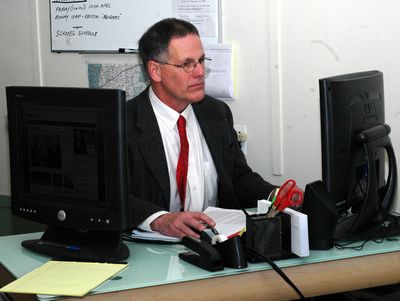Subscriptions
Menu
Advertisements
Center for Sustainable Rural Communities opens in Richmondville
11/13/2012 |
By Patsy Nicosia |

Believing there's a common thread between the economy, environment, technology, and arts and culture, the Center for Sustainable Rural Communities is focusing on these and other issues at its just-opened offices at 296 Main Street, Richmondville
The CSRC got its start as Schoharie Valley Watch, formed a half-dozen years ago to fight off industrial wind turbines and help develop land-use laws to protect local communities.
As the threats changed, so did SVW's focus; now, as CSRC, it's taking a more positive, pro-active role in providing education and outreach to rural communities in Schoharie, Delaware, Otsego, and Greene Counties, said Bob Nied, executive director.
To start, the office will open Monday and Wednesday, 9am-1pm, and Thursday, 6-8pm, as well as by appointment.
There's space for community groups who need a place to meet or to share ideas, a bank of high-speed computers and hands-on help in using them, and one-on-one assistance from volunteers with a variety of expertise.
"We're interested in working on any issue that impacts the rural quality of life," Mr. Nied said, as well as in encouraging citizen participation in local government.
Eventually, Mr. Nied said, the non-profit CSRC hopes to set up satellite offices in Albany and Onondaga Counties.
With other groups fighting against concerns like Constitution Pipeline and hydrofracking, Mr. Nied said he sees CSRC's role as one of encouraging economic development so the region isn't so vulnerable to outside interests.
One way to do that, he said, is by encouraging the development of small-scale, sustainable agriculture.
Access to technology, which would let more people develop small businesses they could run, online, from home, is also important, he said.
"We believe these are the kind of things we can help with-if only by giving people a space where they can come together to work on ideas," Mr. Nied said.
CSRC has already begun working with SUNY Cobleskill on developing a lecture series-the first featured Robert Freeman, director of the State Committee on Open Government--and they'll be airing 15-20 minute segments on the public access TV station SCHOPEG.
"I think we have an obligation to provide information that people can use to become more engaged," Mr. Nied said.
Until the Blenheim Bridge washed away in Hurricane Irene, SVW used it for staging ArtWalk, an exhibition of local artists that regularly drew 3,000 people to a town of 400 residents.
Mr. Nied said CSRC is planning to turn that idea into its new Arts on Main project that would display local art on Man Streets, beginning in Richmondville.
"Again, there's the idea of highlighting local and regional artists while bringing in people to see it," he said.
The CSRC is free and open to everyone and Mr. Nied said they see their role as not necessarily agreeing with everyone who walks through the door, but in helping them find the answers they're looking for.
Contact the CSRC at 872-3903 or online at ruralcommmunities.org.









